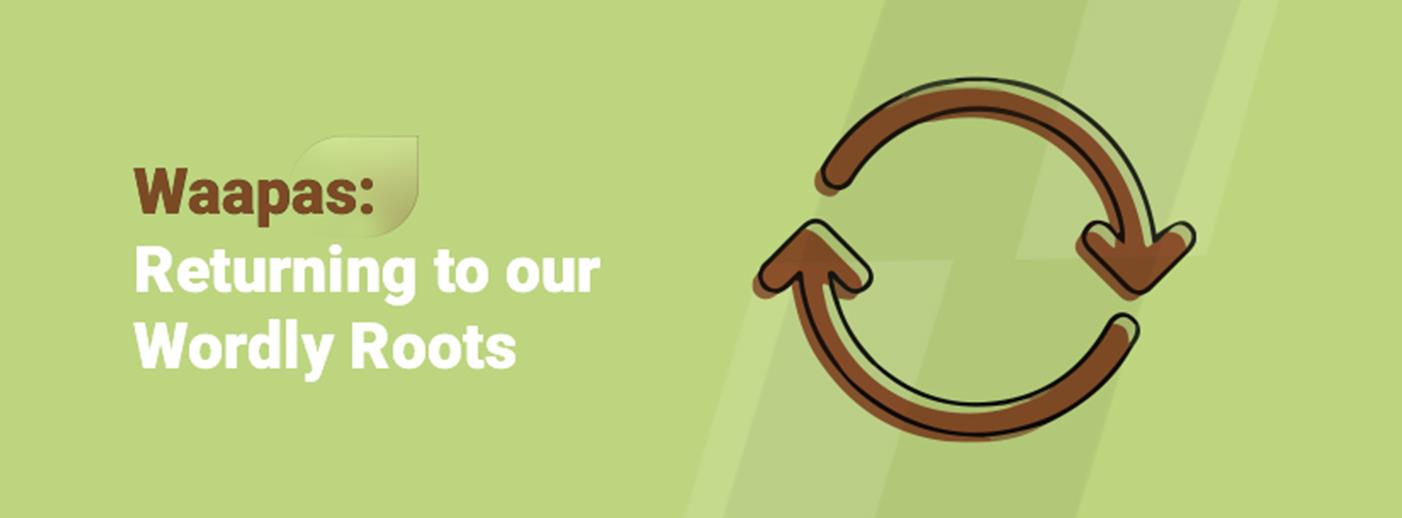زیادہ تلاش کیے گئے الفاظ
محفوظ شدہ الفاظ
کِھسیانی بِلّی کَھمبا نوچے
جسے غصہ آرہا ہو وہ دوسروں پر اپنی جھلاہٹ اتارتا ہے، بے بسی میں آدمی دوسروں پر غصہ اتارتا ہے، شرمندہ شخص دوسروں پر اپنی شرمندگی اتارتا ہے، کمزور کی جھنجھلاہٹ
چَمَنِسْتان
ایسا باغ جہاں پھول کثرت سے ہوں، ایسی جگہ جہاں دور تک پھول ہی پھول اور سبزہ سبزہ نظر آئے، گلزار، گلستان، باغ، پھولوں کا قطعہ، سبز کھیت
Waapas: Returning to our Wordly Roots

shahr ke lafz kar diye vaapas
apnii zaat apnii baat kahne lage
FARHAT EHSAS
A word is often meshed with so many warps and wefts (Taana-Baana) that we barely ever realize how nuanced the fabric of language is. But once we do, it seems like nothing short of a fit!
On the back of this allegorical intro, let’s return to our trade - exploring words! And for today the word in focus is Waapas!
For the uninitiated, first things first: Waapas means to return, retreat, or in the simplest terms, arrive at one’s place of departure again.
Now that we are even on this, let’s see how this word takes shape. At a blush, the word is a compound formed of two words Waa and Pas.
Simple, right?
‘So far’, you’d say. I’d say, ‘buckle up ahead!’
Waa is what is commonly known in Persian as Open (khulaa huaa); that’s why we often see the construction ‘Lab-e-Waa-Shud’, or opened lips, as in speaking or uttering. Here’s Sauda with a great couplet exploring Waa-Shud (opened):
shor ye Guncho.n ke vaa-shud kaa nahii.n ai andaliib
ab chaman me.n tumtaraaq* apnaa dikhaatii hai bahaar
*Tumtaraaq - Pomp, magnificence; pandemonium (Dhoom)
But beyond this widely accepted meaning, Waa also means again, over, or after. And by the same extension of meanings, Waa is the equivalent of the Latin ‘Re’, for instance, words like Waa-Numuudan (to reappear), Waa-bastan (to relate), and Waa-Pursidan (to review; ask again).
In all these words, you’ll see there is a whiff of the word ‘Baaz’, which also means again, and is prefixed to words like Baaz-purs (to ask again) and Baaz-gasht (to come again), etc.
Onto the other half of this word, i.e., ‘Pas’, we find that it’s derived from the Sanskrit ‘Pashcha’, appearing in words like ‘Pashchaat’ and ‘Paschatap’, that is, in rear and repentance, respectively. For us to note, Pas means behind, back, then, and afterwards. It appears in other familiar words such as Pas-Manda (remaining; left behind), Pas-Paa (fleeing), Pas-Parda (behind veil), etc.
Let us now cross over to explore what Waapas means at its origin. As we combine the two, we come across some exciting connotations of this word, one of them is the noun ‘left behind’ (pichhe ChhuuTaa huaa), and other the compound verb to leave behind (as in, Waapas Karnaa/kiyaa huaa).
To let you give a sense of what that exactly means, here’s a stupendous couplet by Maulana-e-Rum:
Chun ba-yak dam sad-Jahaa.n Waapas kunam
Ba-Nigaram gaam-e-nuKHastiin-e-man’ast
When with a single breath I left behind a hundred worlds
I came to see the very first footstep of mine
Now as all intricacies open up about Waa and Pas, you can get to creating new words like ‘Waa-fulaa.n’ (re-something), etc. and take your exploits with Urdu to the next level!
With that we’ve reached the point of no return, i.e., all that you now know about the word Waapas is good enough to save you from retreats of all sorts. And don’t forget to let us know if you have more insights on this word in the comment box.
Delete 44 saved words?
کیا آپ واقعی ان اندراجات کو حذف کر رہے ہیں؟ انہیں واپس لانا ناممکن ہوگا۔





